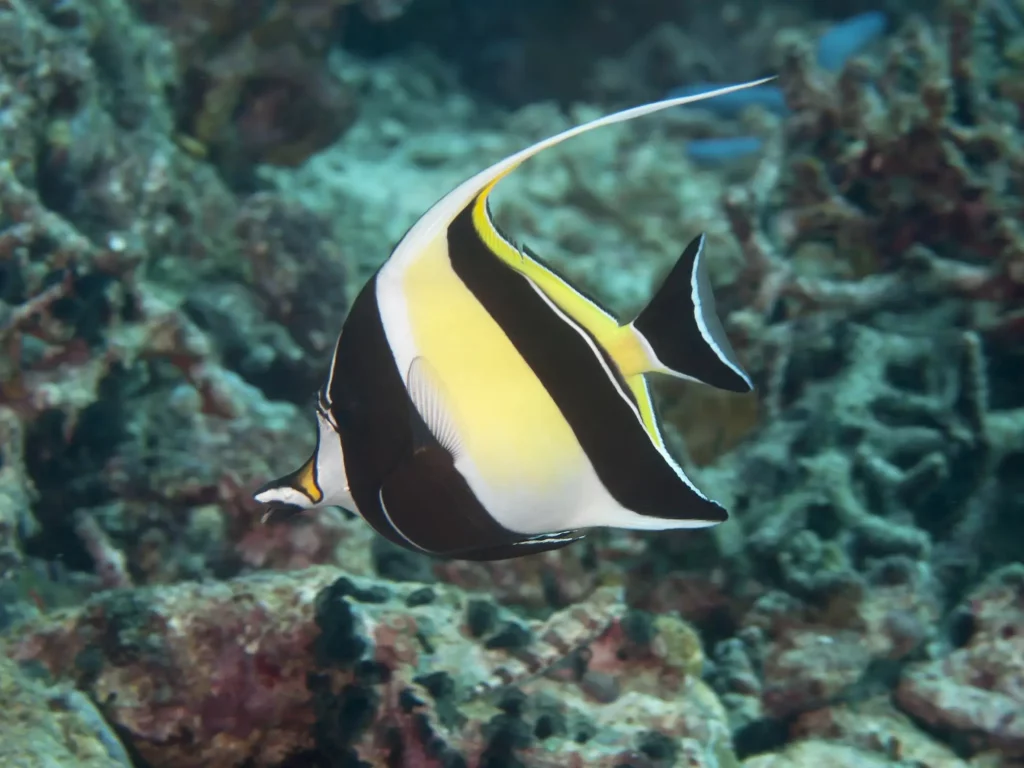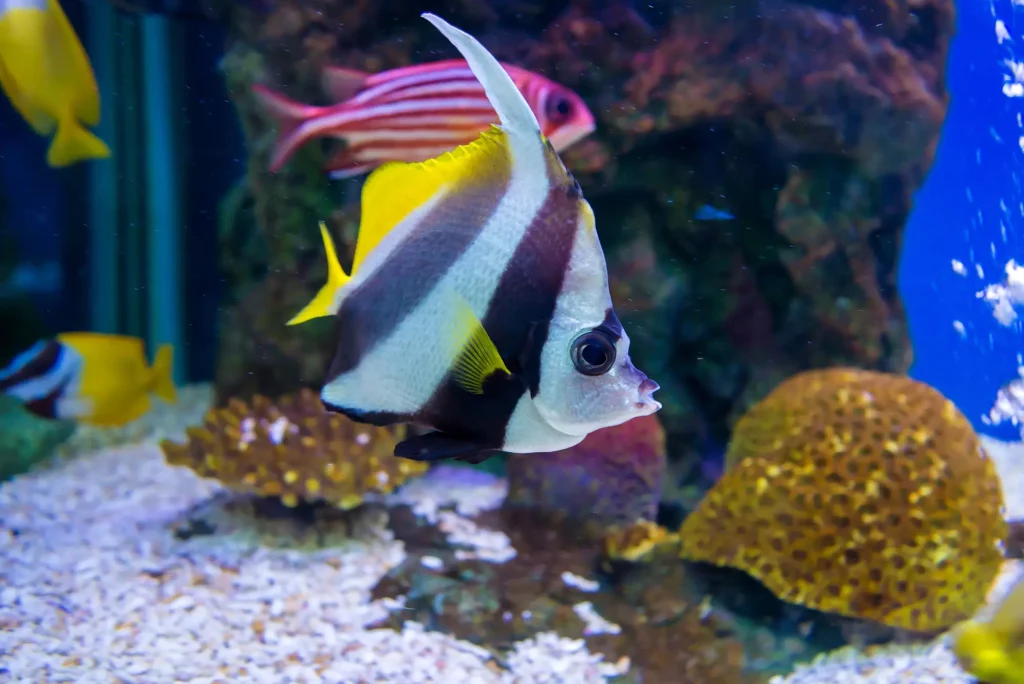
Reef Fish Guide designation and why
Keep it wild
Of all the Moorish idols caught in the wild, a mere five percent will survive the trauma suffered during capture and transportation and only one percent will survive longer than three months in captivity. Adapting poorly to captive systems, they are reluctant to feed and exhibit a higher than normal susceptibility to disease. All of these factors make them an unsustainable choice will little to no chance of survival.
Distribution
Distributed throughout the Indo Pacific Region, north to Hawaii, south to Australia, east to the coast of Central America and west to the Red Sea
Maximum Size
9 inches (24 cm)
Moorish idols (Zanclus cornutus) are one of the most iconic and sought-after fish in the aquarium trade due to their striking appearance, but they pose significant challenges for reef tank enthusiasts, especially regarding sourcing and sustainability.
Reef Compatibility
Moorish idols are generally not considered fully reef safe. They have a tendency to nip at corals, including LPS (large polyp stony) and SPS (small polyp stony) corals, as well as other invertebrates.
This makes it difficult to replicate in a home aquarium setting. This often leads to issues with keeping them fed without damaging the reef structure in the tank.
Challenges with Keeping Moorish Idols
Moorish idols are notoriously difficult to keep in captivity due to their specialized diet and delicate nature. They require a very large, mature tank with stable water conditions, plenty of swimming space, and a varied diet that closely mimics their natural food sources. Stress from transport, acclimation difficulties, and their reluctance to eat prepared foods are common problems, leading to high mortality rates in home aquariums.
Sourcing Moorish Idols
Sourcing sustainable Moorish idols is a significant challenge. Currently, there are no known captive-bred sources for Moorish idols due to their complex reproductive and larval development needs. Most Moorish idols available in the aquarium trade are wild-caught, primarily from regions like Hawaii, the Indo-Pacific, and other tropical reefs. Wild-caught specimens contribute to the depletion of natural populations and can harm reef ecosystems due to collection methods that may be unsustainable or damaging.
Sustainable Alternatives
Given the lack of captive-bred Moorish idols, those seeking sustainable choices should consider alternative species that resemble the Moorish idol in appearance but are much easier to care for and more readily available from captive-bred sources. A popular alternative is the Heniochus species, particularly the Heniochus diphreutes, commonly known as the “Bannerfish.” These fish resemble the Moorish idol in body shape and coloration but are far hardier, more adaptable to aquarium life, and available from sustainable, captive-bred sources.

Where to buy Heniochus diphreutes (Bannerfish)?
Captive-bred Heniochus diphreutes, also known as the schooling bannerfish, are more accessible through a few specialized aquaculture facilities and vendors that focus on sustainably bred marine species. In the U.S., the following sources are known for providing captive-bred Heniochus diphreutes:
- Biota Aquariums – Biota is a reputable company that specializes in captive-bred marine fish and invertebrates. They have a commitment to sustainability and often offer a variety of captive-bred species, including Heniochus diphreutes. They work closely with aquaculture facilities to ensure high-quality and healthy fish.
- ORA (Oceans, Reefs & Aquariums) – ORA is another well-known source for captive-bred marine fish and corals. They are a pioneer in the industry for breeding a wide range of marine species and occasionally offer Heniochus diphreutes as part of their sustainable product line.
- Quality Marine – This company distributes a variety of sustainably sourced marine species, including captive-bred options. They are a supplier to many retail stores and online vendors, so you might find their captive-bred Heniochus diphreutes through retailers who source from them.
- Local Fish Stores and Online Retailers – Some specialty local fish stores (LFS) and online retailers like LiveAquaria, Blue Zoo Aquatics, and AlgaeBarn may occasionally stock captive-bred Heniochus diphreutes from the above suppliers. It’s worth checking with these stores directly or requesting special orders if they do not have them in stock.
When purchasing, always confirm with the vendor that the Heniochus diphreutes are indeed captive-bred to ensure you are supporting sustainable practices.
Conclusion
While the allure of keeping a Moorish idol in a reef tank is strong due to their beauty, the challenges and ethical considerations make them a difficult choice for most aquarists. The lack of sustainable sourcing options means that the environmental impact of wild-caught specimens cannot be overlooked. Enthusiasts committed to sustainability and responsible reef keeping are encouraged to explore alternative species that provide a similar aesthetic appeal without compromising on ethical standards. For those determined to keep a Moorish idol, it is crucial to have extensive experience, a large and stable tank environment, and a commitment to meeting their complex dietary needs.
